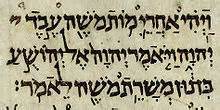"Observe and Obey" -- Nehemiah 10:28-39
 Wednesday, February 15, 2017 at 09:40AM
Wednesday, February 15, 2017 at 09:40AM  The Nineteenth in a Series of Sermons on Ezra-Nehemiah
The Nineteenth in a Series of Sermons on Ezra-Nehemiah
When the people of God’s chosen nation gather together to pray and repent of their sins (as Israel does in Nehemiah 9), what happens next? Their prayer, which amounts to recounting back to YHWH all of the gracious things he has done for his people, is also a stark reminder of Israel’s perpetual sin and hard-heartedness. As the people confess their sins and repent of them, the fruit of this repentance is the desire of the people to renew their covenant with YHWH. YHWH has been faithful to his covenant promises, while the people of Israel have not. The tangible sign of the people’s confession of sin and their desire to repent can be seen in Nehemiah 10, as Nehemiah recounts the covenant renewal ceremony which took place in Jerusalem, shortly after the people had completed rebuilding the city’s walls and gates, setting the stage for the course of redemptive history to follow–what we commonly speak of as Second Temple Judaism.
The covenant renewal ceremony which unfolds in chapter 10 actually begins in Nehemiah 9:38, where we read, “because of all this we make a firm covenant in writing; on the sealed document are the names of our princes, our Levites, and our priests.” The “this” to which Nehemiah refers is the prayer and confession of sin found in chapter 9:5b-37. The law was read three times (including large sections of the Five Books of Moses with exposition and explanation so that the people are said to understand) and was followed by a celebration of the Feast of Tabernacles according to the mandate in Scripture (Ex. 34:22 and Lev. 23:42-43). After the feast had ended, the assembled people of Israel remained in Jerusalem and were led by the Levites pray to YHWH, recounting his many mighty and miraculous acts in calling and preserving his people Israel (despite their sin). Aware of their repeated disobedience, the people confess their sins (both personal and national). The celebration of the feast, the reading of the law, and the confession of sin are clearly the fruit of God’s Spirit working through the word, bringing about a genuine reformation in Israel. All of this leads the people to seek to renew their covenant (originally made with YHWH at Mount Sinai), which is recounted in verse 38 of chapter 9 and throughout chapter 10.
When Nehemiah speaks of a “firm covenant,” he uses a unique word (ʾămānâ – “agreement”). But the verb kārat used here appears many times throughout the Old Testament in reference to “making” or “cutting” a covenant (bĕrît), with YHWH. Nehemiah is using similar language to that in the previous chapter (9:7–8) when the prayer of the people recounted Abraham’s faithfulness to YHWH using the same Hebrew root ʾāmān in relation to God’s covenant with Abraham. As Abraham believed God’s promise, so too, the post-exilic covenant community of Israel must be faithful to YHWH–manifest in what follows in the renewal of Sinai covenant.
Nehemiah indicates that are three different classes of signatories on the sealed document in the list of names which follows; princes (the civil authorities appointed or approved by Israel’s Persian suzerains), priests, and Levities, whose names appear in verses 2-13 of Nehemiah 10, and then a number of heads of households are mentioned in verses 14-27.
To read the rest of this sermon, Click Here


Reader Comments